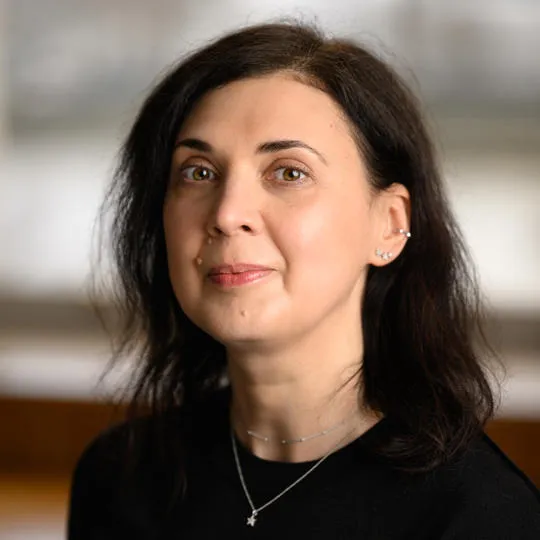
Professor Claudia Aradau
Professor of International Politics
Research interests
- International relations
- Politics
Biography
Claudia Aradau is Professor of International Politics in the Department of War Studies and Principal Investigator of the Consolidator Grant SECURITY FLOWS (‘Enacting border security in the digital age: Political worlds of data forms, flows and frictions’), funded by the European Research Council (2019-2024).
Her research has developed a critical political analysis of security practices. As more and more problems and people become constituted as objects and subjects of security, her research has inquired into the effects this has for political subjectivity and democracy. Her current research focuses on how digital technologies reconfigure security and surveillance practices, and how algorithms and machine learning recast relations between security, democracy and critique.
She received the 2023 Distinguished Scholar Award by the International Political Sociology Section of the International Studies Association. Her latest book, Algorithmic Reason: The New Government of Self and Other (with Tobias Blanke) won the 2023 Best Book Award by the Science, Technology and Arts in International Relations (STAIR) section of the International Studies Association.
Claudia spent a decade as associate editor and editor of Security Dialogue (until 2018). She is a member of the editorial collective of Radical Philosophy and member of the editorial boards of Security Dialogue, International Political Sociology and Politics.
Research interests
- Critical security studies
- Security practices in the digital age
- International political sociology
- Critical methods in international relations
Her current research develops three main areas. Firstly, the ERC project SECURITY FLOWS examines the epistemic, political and ethical implications of the datafication of border security. The project is situated at the intersection of critical approaches to borders and security, Science and Technology Studies and data studies. A recently completed project, GUARDINT (‘Oversight and intelligence networks: Who guards the guardians?’) has inquired into how the relation between security and democracy is recast when digital surveillance has become both increasingly normalised and intangible.
Secondly, a book project co-authored with Tobias Blanke, entitled Algorithmic Reason: The New Government of Self and Other, analyses the ways in which big data and algorithmic practices have reconfigured how social and political problems are made knowable and governable. The book is available open access from Oxford University Press.
Thirdly, she is developing new conceptual vocabularies and methodological devices for critical security studies and International Relations. She is working on the methodological relevance of controversies and disputes to global politics and the conceptualisation of (invisible) work.
Teaching
has designed modules on ‘Critical Security Studies’ (BA3) and ‘Risk and Uncertainty in Global Politics’ (MA). She has been programme director of the MA in International Conflict Studies and co-convener of the MA’s core module.
Doctoral supervision
Claudia welcomes PhD applications that develop critical engagements with security practices, particularly border security and mass surveillance, in the digital age.
Recent publications
Aradau, C and T Blanke (2022), Algorithmic Reason: The New Government of Self and Other (Oxford: Oxford University Press).
Valdivia, A, C Aradau, T Blanke and S Perret (2022), Neither opaque nor transparent: A transdisciplinary methodology to investigate datafication at the EU borders, Big Data & Society 9(2).
Aradau, C and S Perret (2022), The politics of non-knowledge at Europe’s borders: Errors, fakes and subjectivity, Review of International Studies 48(3): 405-24.
Aradau, C and L Canzutti (2022), Asylum, borders and the politics of violence: From suspicion to cruelty, Global Studies Quarterly 2(2).
Aradau, C (2022), Experimentality, surplus data and the politics of debilitation in borderzones, Geopolitics 27(1): 26-46.
Aradau, C and T Blanke (2021), Algorithmic surveillance and the political life of error, Journal for the History of Knowledge 2(1).
Aradau, C and E Mc Cluskey (2021), Making surveillance unacceptable? Security, democracy, and the political sociology of disputes, International Political Sociology 16(1).
Aradau, C and Tazzioli, M (2020) Biopolitics Multiple: Migration, Extraction, Subtraction. Millennium vol. 48 (2):198-220.
For a full list of publications, please consult the Research Portal at King’s or Claudia’s page on academia.edu.
Research

Research Centre in International Relations (RCIR)
The Research Centre in International Relations conducts research on practices of security and conflict, their transformation, and their social and political implications.

Centre for Technology, Ethics, Law and Society (TELOS)
Explore research at King's through the Centre for Technology, Ethics, Law and Society (TELOS)

Centre for Digital Culture
The Centre for Digital Culture at King’s College London is an interdisciplinary research centre promoting research and debate on digital culture

King's Cybersecurity Centre
An EPSRC-NCSC Academic Centre of Excellence in Cyber Security Research (ACE-CSR). It provides expertise on most areas of cyber security, it has a critical mass of researchers working on three main research themes and their interrelationship.

KingsCAT: Capture and Analysis Tool for Social Media Research at King’s College London
KingsCAT is an instance of the open source 4CAT: Capture and Analysis Toolkit set up to support interdisciplinary and collaborative social media research.
Project status: Ongoing
News
War over AI, not with AI: experts warn of emerging security risks
The Digital Futures of Security brought together experts to explore how artificial intelligence and cybersecurity are reshaping the concept of security in the...
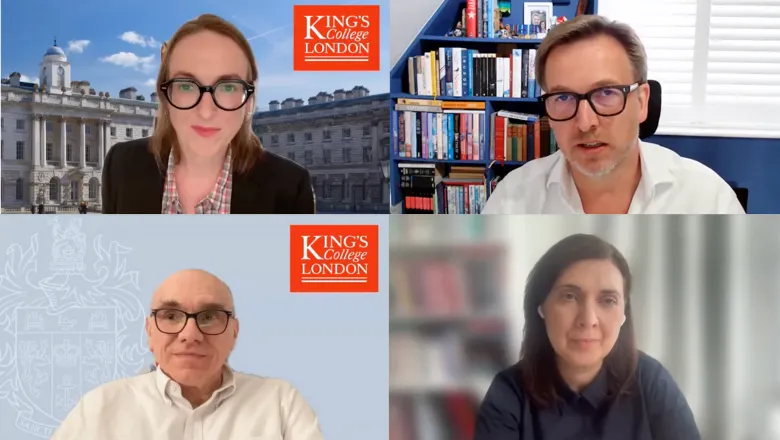
Events
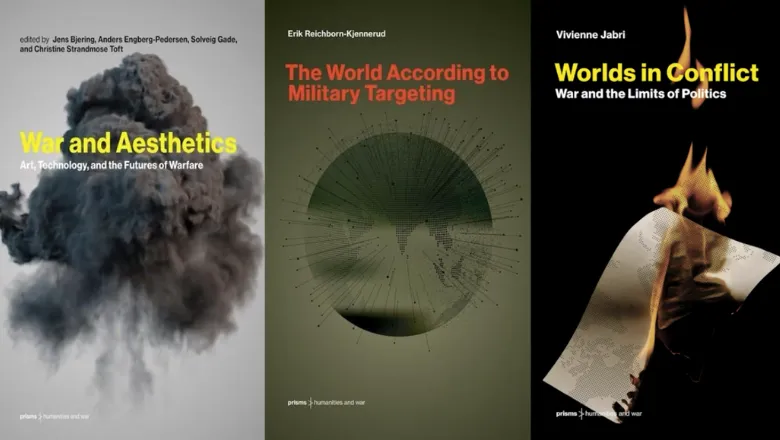
Writing Critically About War: Joint Book and Series Launch
This half-day book launch brings together leading authors writing critically and from an interdisciplinary vantage point about war.
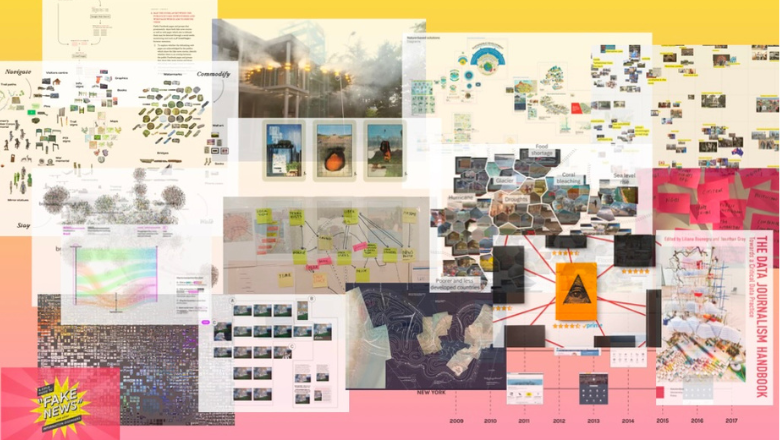
Digital Methods x Social and Policy Research — Tools, Examples and Starting Points
How can digital material from the web and social media be gathered and analysed for social and policy research?
Please note: this event has passed.

How to Do Things with Digital Text: Methods and Critique
The new SSPP Methods Centre holds its first event for researchers
Please note: this event has passed.
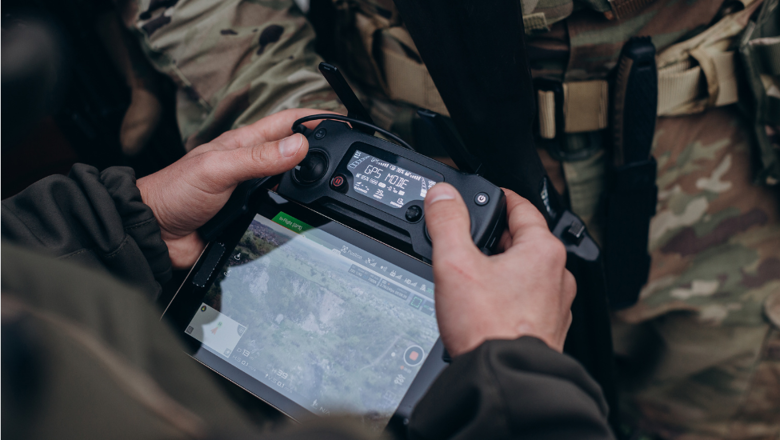
Digital Futures of Security
Leading experts explore how emerging technologies are reshaping the global security landscape.
Please note: this event has passed.

How to (un)do borders with data
This conference is a deep exploration of datafied borders and counter-data, featuring insights from the SECURITY FLOWS project on the political and ethical...
Please note: this event has passed.
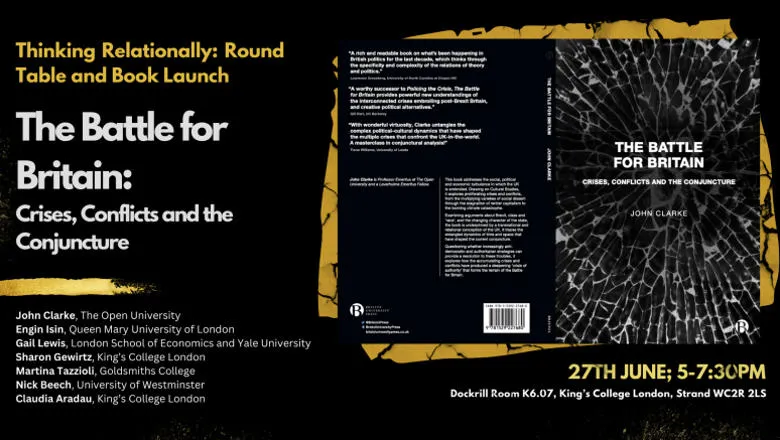
'The Battle for Britain' Book Launch & Round Table
Join John Clarke for the presentation of his latest book, followed by a discussion panel with scholars from different disciplines.
Please note: this event has passed.
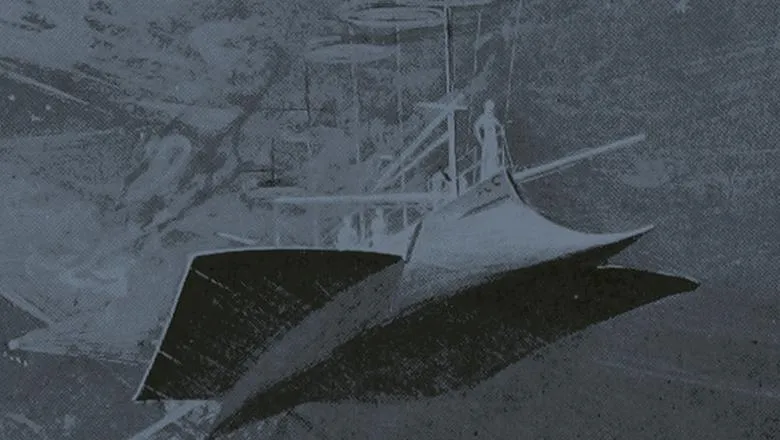
Dreamworlds of Race: Empire and the Utopian Destiny of Anglo-America
Professor Duncan Bell joins us to discuss his book, 'Dreamworlds of Race: Empire and the Utopian Destiny of Anglo-America'
Please note: this event has passed.
Research

Research Centre in International Relations (RCIR)
The Research Centre in International Relations conducts research on practices of security and conflict, their transformation, and their social and political implications.

Centre for Technology, Ethics, Law and Society (TELOS)
Explore research at King's through the Centre for Technology, Ethics, Law and Society (TELOS)

Centre for Digital Culture
The Centre for Digital Culture at King’s College London is an interdisciplinary research centre promoting research and debate on digital culture

King's Cybersecurity Centre
An EPSRC-NCSC Academic Centre of Excellence in Cyber Security Research (ACE-CSR). It provides expertise on most areas of cyber security, it has a critical mass of researchers working on three main research themes and their interrelationship.

KingsCAT: Capture and Analysis Tool for Social Media Research at King’s College London
KingsCAT is an instance of the open source 4CAT: Capture and Analysis Toolkit set up to support interdisciplinary and collaborative social media research.
Project status: Ongoing
News
War over AI, not with AI: experts warn of emerging security risks
The Digital Futures of Security brought together experts to explore how artificial intelligence and cybersecurity are reshaping the concept of security in the...

Events

Writing Critically About War: Joint Book and Series Launch
This half-day book launch brings together leading authors writing critically and from an interdisciplinary vantage point about war.

Digital Methods x Social and Policy Research — Tools, Examples and Starting Points
How can digital material from the web and social media be gathered and analysed for social and policy research?
Please note: this event has passed.

How to Do Things with Digital Text: Methods and Critique
The new SSPP Methods Centre holds its first event for researchers
Please note: this event has passed.

Digital Futures of Security
Leading experts explore how emerging technologies are reshaping the global security landscape.
Please note: this event has passed.

How to (un)do borders with data
This conference is a deep exploration of datafied borders and counter-data, featuring insights from the SECURITY FLOWS project on the political and ethical...
Please note: this event has passed.

'The Battle for Britain' Book Launch & Round Table
Join John Clarke for the presentation of his latest book, followed by a discussion panel with scholars from different disciplines.
Please note: this event has passed.

Dreamworlds of Race: Empire and the Utopian Destiny of Anglo-America
Professor Duncan Bell joins us to discuss his book, 'Dreamworlds of Race: Empire and the Utopian Destiny of Anglo-America'
Please note: this event has passed.
